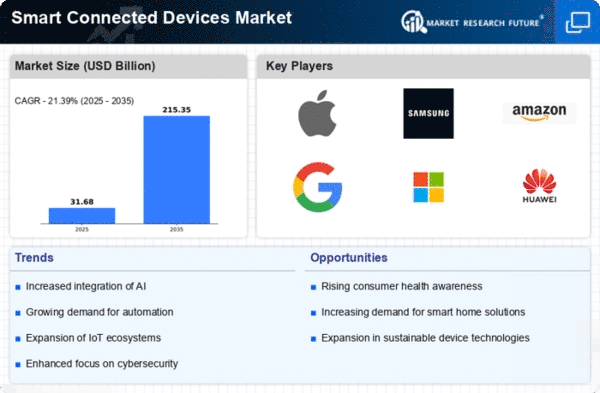Market Trends
Key Emerging Trends in the Smart Connected Devices Market
The Smart Connected Devices Market is witnessing dynamic trends as technology continues to advance, and the demand for interconnected and intelligent devices grows across various sectors. One significant trend is the increasing integration of Internet of Things (IoT) technologies in smart devices. From smart home appliances and wearable devices to industrial sensors and healthcare gadgets, the connectivity provided by IoT enhances device functionality, enabling seamless communication and data exchange. This trend is reshaping how consumers and industries interact with their surroundings, fostering a more interconnected and automated environment.
Additionally, the Smart Connected Devices Market is experiencing a surge in demand for smart home devices. With the rise of smart homes, consumers are adopting connected devices such as smart thermostats, security cameras, and voice-activated assistants. These devices offer convenience, energy efficiency, and enhanced security, driving the market's growth. The integration of artificial intelligence (AI) and machine learning (ML) in smart home devices further enhances their capabilities, enabling personalized automation and intelligent decision-making based on user preferences.
The automotive industry is a key driver of innovation in smart connected devices. The advent of connected cars with features like in-car infotainment systems, GPS navigation, and vehicle-to-vehicle communication is transforming the driving experience. The market is witnessing the integration of advanced sensors and communication technologies to enable real-time monitoring, diagnostics, and connectivity for improved safety, navigation, and entertainment within vehicles.
Furthermore, the healthcare sector is embracing smart connected devices to enhance patient care and monitoring. Wearable devices, such as fitness trackers and smartwatches, provide individuals with real-time health data, promoting a proactive approach to personal well-being. Additionally, medical devices equipped with connectivity features enable healthcare professionals to remotely monitor patients, improving treatment outcomes and reducing hospitalization rates. This trend aligns with the broader goal of leveraging technology for more efficient and patient-centric healthcare services.
In the industrial sector, the adoption of Industrial Internet of Things (IIoT) devices is shaping the Smart Connected Devices Market. Connected sensors, actuators, and monitoring devices are being deployed to enhance operational efficiency, reduce downtime, and enable predictive maintenance in manufacturing and industrial processes. The data generated by these devices contribute to data analytics and predictive modeling, optimizing production processes and fostering the growth of Industry 4.0 initiatives.
Security and privacy concerns are emerging as critical considerations in the Smart Connected Devices Market. As the number of connected devices increases, the vulnerability to cyber threats rises. Manufacturers are focusing on implementing robust security measures, including encryption protocols, authentication mechanisms, and regular software updates, to safeguard user data and prevent unauthorized access. This trend reflects the industry's commitment to addressing the evolving challenges of cybersecurity in the interconnected landscape.
Moreover, the market is witnessing a move towards edge computing in smart connected devices. Edge computing involves processing data closer to the source of generation rather than relying solely on centralized cloud servers. This approach reduces latency, enhances real-time processing capabilities, and addresses bandwidth constraints, making it particularly relevant for applications like autonomous vehicles, industrial automation, and smart cities.

















Leave a Comment